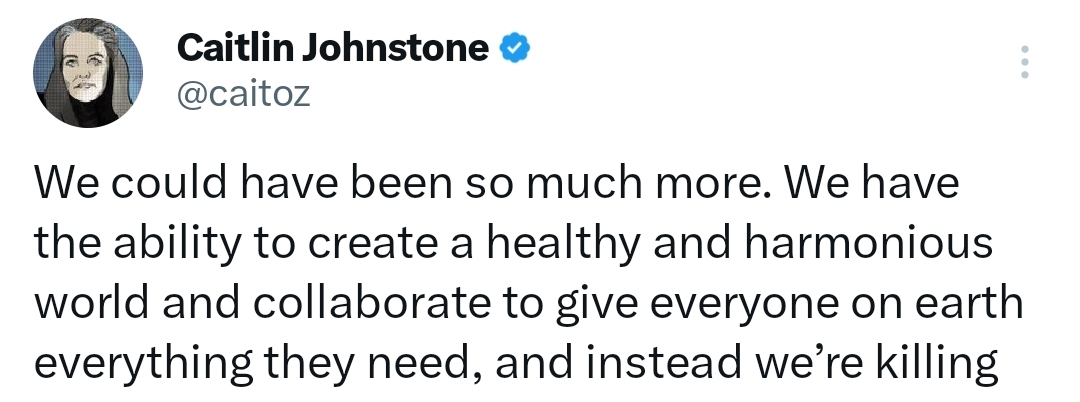They merely said that being separated from God means suffering, while following H…er.im means walking towards the establishment of H…er.is Kingdom/City unto Earth. They talked more about Hell as a state than as a physical place, but, well… who cares nowadays, right ? Parabola never taught us anything about the real world, the spirit doesn’t exist, and morals are relative, they were simply naive ignorants who never had anything to teach us, embrace modernity and reject 100% of the past.
«hallowed be thy Name, thy Kingdom come», that’s ‘the christians’ Aim’/Islam
The world is ugly sometimes
We(sterners), aggressors, are still the main(~only) obstacle to ‘world peace’/‘a union of diversities’
♪All we are saaying…♬(, are we even trying ? we could/should/must protect them&us)
- 5 Posts
- 16 Comments
anyone who worships God is also good by default, and of course this logic follows that anyone that doesn’t worship God is evil by default.
If that was the case they wouldn’t put an emphasis on hypocrites.
deleted by creator
If you agree that God gave us cancer, then you should normally agree as well that S.H…e gave us everything else.

 1·1 year ago
1·1 year agoThanks for the explanation, but since you, along with mathematics, agree that there’s a surface, there should be a normal/perpendicular, and you can get more or less close to that surface, i guess i just can’t wrap my head around it, it’d mean that the hypersphere is on both sides of its surface ?
I’ve read elsewhere that the universe would be this (hyper)surface, i wonder what the surface of a 5d-sphere would look like then.

 2·1 year ago
2·1 year agoYep, just read some stuff on Quora about 4D spheres, and still don’t get it 🤷♂️
You have an edge on the Earth, both above and below, i can’t imagine the material part of the All circling upon itself, how would you visualise from outside ?
I still see an edge with an hypersphere, well, w/e, thanks for the answer anyway :) !

 4·1 year ago
4·1 year agoAlthough “commonly accepted” may be pushing it, i can’t imagine a finite universe(, i.e., ‘with a positive curvature’/spherical), with the old question : what happens at the edge if i push it with a stick ?
(I.i.r.c., the answer is that the edge is expanding faster than the speed of light or sthg)(And, kinda unrelated, fractal universes piling upon each other may make sense)

 02·1 year ago
02·1 year agoAnd i would prefer if Lemmy was the number one social media in terms of usage, i hope that it’s @dessalines goal if it’s not yours, once again you would just have to block the bot if you don’t desire to have more content. Thanks for the chat.

 0·1 year ago
0·1 year agoThat’s the only thing worrying me, yes, but since lemmit did it… i.d.k. Thanks for the comment !

 11·1 year ago
11·1 year agoIf you prefer that Lemmy stays small and eventually dies because of a lack of content then it’s your problem, don’t make it mine.
Only people subscribed to these communities will see these posts, except in the local feed if your instance hasn’t defederated with lemmit.
If there’s only one bot who mentions in his posts that you can block him, then your issue is solved as well as mine, and Lemmy will become as attractive as Reddit. Can’t believe your opinion has so much support, it’s like you’d prefer Lemmy to stay insignificant.

 1·1 year ago
1·1 year agoYep that’s what i’m currently doing with mapporn, it’s easier with a computer, i’m glad to have found out this bot exists(, or existed until 3 days ago, don’t yet know how it’ll turn out).

 32·1 year ago
32·1 year agoFor you perhaps, but for me it’s the lack of content/communities that make Lemmy inferior. Just block this bot if you don’t want to see it on your instance, and the userbase as a whole will be satisfied :)

 1·1 year ago
1·1 year agoThe latter
But thanks, i didn’t know about lemmit even if i read about the different instances before, it’s still a bit hard to find communities of interest(, but not anymore than with reddit, youtube, twitter, facebook, discord, etc ). I’ve subscribed to their TIL but the search function for Sync or Jerboa aren’t very informative.

 14·1 year ago
14·1 year agoIf a spam is defined as the o.p. not interacting then yes that’d be a spam, but most people are here for the picture or the information, it shouldn’t be a debate that reddit’s content is more or less the only thing making them superior to Lemmy, the userbase comes afterwards. That’d be an undeniable improvement, we wouldn’t “lose” anything anymore by coming over to Lemmy.
And thanks for the advice, i subscribed to TIL, that was exactly what i was looking for, but there’s not a lot of subreddits(, edit : on the contrary, there’s a lot of them, more visible on a computer, but if you’re reading this comment and are interested, as a reminder you may have forgotten that you can still subscribe to communities belonging to instances your own instance has defederated with, it fortunately has zero impact, only on the local feed).So, that’s legal apparently.

 21·1 year ago
21·1 year agoDo you remember their names ?
If people loved the content on reddit then they would continue to love it on Lemmy, it’d be the same posts, not anymore of a spam here than there, that’s not a decisive counter-argument for me but thanks for the reply :)

 2·1 year ago
2·1 year agoAn instance would simply post(, or create a community for each large or interesting-enough subreddits that doesn’t already exist here,) every day all the posts from the last 24 hours, with the same title and the same picture. A simple bot should be able to do the trick without accessing the a.p.i.(, or even so by paying less than a personal app since it would be a single “person”(bot) making the calls one time per day ; in any case, most likely not a technical problem).
If it’s open and automated to such an extent then it may bring trouble, but if such content is free to be stolen then it should perhaps be done i suppose(, even if reddit won’t like it, especially if it’s before their first public offering, but probably afterwards as well).




I don’t entirely agree with my comment either, because there’s multiple interpretation of Hell.
One of them is interesting, it says that if our consciousness survives after our death, our mind will finally think clearly, we’ll remember our past better than if it happened today, and we’ll be overwhelmed by shame, this hell would be created by ourselves.
Another one would talk about a real place, but not in the afterlife but right here, on Earth(, it combines perfectly with this talk of afterlife if you believe in reincarnation), and says that if we all live our lives ‘searching for’/‘aiming at’ God, then our descendants/reincarnations will live in Paradise(, or in Hell if we don’t).
There’re other interpretations, as well as the thought that we’re not free since we’re determined, so God decided before our birth whether we would end up in Hell or in Paradise, a thought discussed in the Middle-Ages and rejected in favor of free-will(, i don’t think Spinoza would disagree with the conclusion that God predestined us for Hell, if he believed in Hell).
Obviously, the most common explanation is that police(wo)men didn’t existed back then, God-fearing people was the equivalent of virtuous people, even when nobody can see/stop them.